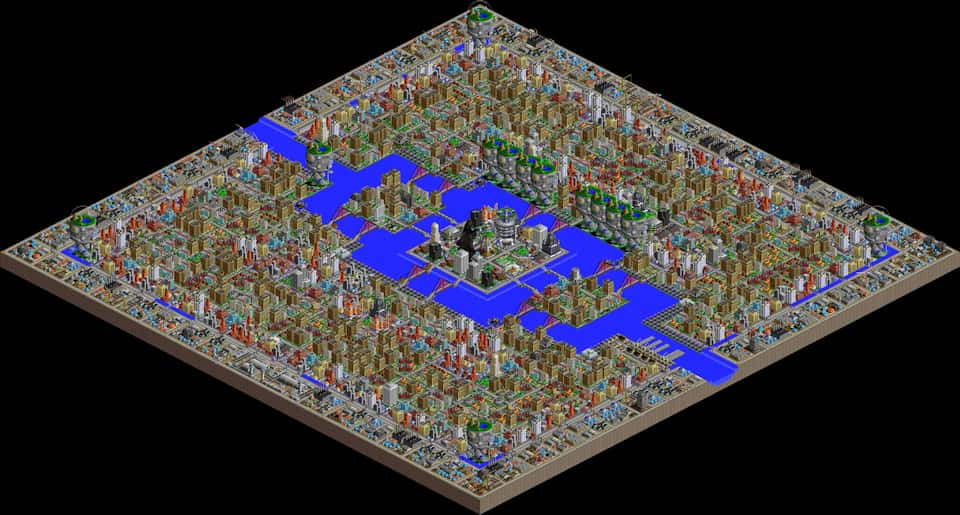SimCity 2000
Turns out that I already had that sound card for Twentieth Century. It was in a tub of stuff my dad had brought over a few months ago. Even better, the card is from the actual 20th century. It even has good MIDI, too! I picked up a bunch of drive cables from home, so I was able to connect a floppy drive and flash the motherboard BIOS to accept bigger hard drives.
So I've started installing things on it. With a 40 gig drive instead of a 2 gig one, running things without the CD becomes very possible for everything. So I've been playing some of my personal classics on it, starting with SimCity 2000. Good thing too; I was getting bored.
I'm not sure how many thousands of hours of my life I've lost to this game. This is one of the oldest games I have. Putting it another way, this is definitely the oldest sandbox type game I have. Unlike other games at the time, this game is not linear; it's a simulation. It starts to get weird when my dad started using this as an example of civic engineering in conversations.
There's an infinite amount of ways you can do this, but I eventually boiled it down to a formula. Before you start a city, you have the opportunity to edit the terrain, and you would be stupid not to. I like generally flat terrain, just to make things easier. I also have a lot of waterfalls to put hydroelectric dams on, as they are only one of two types of power plants that don't blow up after 50 years. My play style involves lots of 6x6 tile zones. I use commercial zones as a buffer between my residential and polluting industrial zones. In some random places, I build parks to increase land value.

In this city, New Pandorae, I have a river. I like to put municipal water infrastructure along the river, to maximize its effectiveness. Along the outer edge, I have a raised plateau where I put all my industrial zones. The reasoning being that there is more wind at higher altitudes: more wind = less pollution. I put water on the cliffs of that plateau, so I have waterfalls; put hydroelectric dams on waterfalls and I've easily knocked out a few objectives. I have a ring of commercial zones inside that. Since commercial zones aren't demanded that much in a small city, I also like to use that area for some municipal services (fire, police, schools, etc.). Inside that ring, there is a thick ring of residential zones, then a thin ring of commercial. There are residential zones along the river and on the two smaller islands in the river. There are some high value commercial zones on the bigger island, along with a dome, stadium, zoo, four parks, and two arcologies. I have 13 launch arcologies distributed around the city. An airport is located on the middle of an edge (cutting into the industrial zone), and a water port along the river.
Some years after I stopped playing, I picked up SimCity 4. It was a mess, and super complicated compared to this. There was simply too much stuff to keep track of, and I found it too... analog and free-form. I didn't play it for too long, and hated it.
Because I'm using an older machine to play this on, it plays slower. This is a good thing, because the fastest speed setting doesn't consider the effects of Moore's Law, and goes as fast as the computer can calculate. In this case, a slower machine lets you think.
Wouldn't a more analog game be a better simulation of real life?
Your city seems almost perfect. City planners never get this much control, especially with the whole editing terrain before starting a city thing.
Yes, while a more analog game would be more like real life, it's supposed to be a game, i.e., not real life. I like games that are better than that. I'm pretty sure Monopoly would not be more fun if you had to source materials to build things, then wait for the contractors who won't come at the time they said.
You can't complain about this anymore. It's perfect!